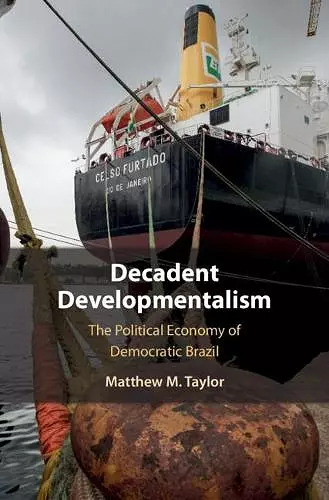Decadent Developmentalism
The Political Economy of Democratic Brazil
Format:Hardback
Publisher:Cambridge University Press
Published:12th Nov '20
Currently unavailable, and unfortunately no date known when it will be back
This hardback is available in another edition too:
- Paperback£36.99(9781108827553)

Complementarities between political and economic institutions have kept Brazil in a low-level economic equilibrium since 1985.
This book describes the institutional context that has thwarted the emergence of either a capable developmental or a neoliberal alternative in Brazil since the return to democracy in 1985. The work is a key source for scholars and students of comparative political economy, political science, economics, sociology, and development studies.Brazil features regularly in global comparisons of large developing economies. Yet since the 1980s, the country has been caught in a low-level equilibrium, marked by lackluster growth and destructive inequality. One cause is the country's enduring commitment to a set of ideas and institutions labelled developmentalism. This book argues that developmentalism has endured, despite hyperactive reform, because institutional complementarities across economic and political spheres sustain and drive key actors and strategies that are individually advantageous, but collectively suboptimal. Although there has been incremental evolution in some institutions, complementarities across institutions sustain a pattern of 'decadent developmentalism' that swamps systemic change. Breaking new ground, Taylor shows how macroeconomic and microeconomic institutions are tightly interwoven with patterns of executive-legislative relations, bureaucratic autonomy, and oversight. His analysis of institutional complementarities across these five dimensions is relevant not only to Brazil but also to the broader study of comparative political economy.
'Few understand the interaction of politics and the economy in Brazil better than Matthew Taylor, whose superb study shows how political and economic complementarities constrain Brazil's growth. Essential reading for all seeking to understand the Brazilian condition, the book will be of special value for those, be they 'developmentalists' or 'neo-liberals', who seek to restore growth with equity in Brazil.' David M. Trubek, University of Wisconsin-Madison
'Decadent Developmentalism is the successor to Peter B. Evans' 1979 academic blockbuster on Brazil, Dependent Development. The early chapters on the continuing large economic role of the state, despite Brazil's moderate neoliberal turn in the 1990s, are comprehensive and competent, while the later chapters on the pernicious failures of political and legal controls on state actions under 'coalitional presidentialism' are brilliant.' Leslie Elliott Armijo, Simon Fraser University, Vancouver
'Despite its frequent economic crises, some argue that Brazil is a stable democracy with existing checks and balances that help avert severe institutional disruption and may eventually support long term economic growth. Matthew Taylor provides a distinct and perhaps more realistic picture of the country as a state subject to a nexus of complementary forces that shape and distort development policies. Although focusing on Brazil, the framework proposed and discussed in the book should be a reference for those interested in how country-level institutions promote or constrain development.' Sérgio Lazzarini, Insper
'This is one of the most important books on Brazilian politics in recent decades. It provides a panoramic view of Brazil's political economy since 1985. It is essential reading for scholars and analysts of Brazil and of Latin American political economy…In sum, Decadent Developmentalism offers a rich analysis of Brazil's political economy under democracy, and it provides a clear answer to the question of why Brazil has not fared better since 1985.' Scott Mainwaring, Latin American Research Review
'Brazilianists will not be surprised by Taylor's conclusions, but their understanding of Brazil will be greatly enriched by his analysis. Taylor has produced a book of immense value for scholars seeking to make sense of the most complicated country in Latin America. His analysis is impressively thorough and well documented as it unpacks in rich detail the driving forces that have shaped the commanding heights of the Brazilian state, the political class, the private sector, and the many interlocking connections that reinforce the continuation of the country's elite cartel. Decadent Developmentalism should become an essential contribution to the broader debate in Latin America on the largely disappointing outcomes of the region's democracies …' Al Montero, Latin American Politics and Society
'Accounting for such a diverse and comprehensive set of 'stylized facts' about Brazil's development within a single theory is a remarkable achievement, and this book holds out a crucial lesson for social scientists: rather than a constant push for narrower, more precise research questions, expanding the scope of explanation can in fact stimulate a higher level of theory which is much more effective at convincingly explaining and reconciling diverse outcomes…As a result, this book is essential reading not just for Brazilianists and students of the political economy of development, but for political scientists and public policy scholars more broadly who are looking for new conceptual and theoretical tools to help them explain complex outcomes, and a template for how to apply those tools.' Jonathan Phillips, Brazilian Political Science Review
'What makes Taylor's analysis of the Brazilian case particularly insightful, and one of the book's key contributions, is how it sheds light on the complementarities that exist across the five domains that together push firms, consumers, and taxpayers to tolerate the system and behave in a way that reinforces the underlying rules of the game.' Renato Lima-de-Oliveira, Perspectives on Politics
'Decadent Developmentalism is as sober as it is provocative, offering an institutionalist analysis of Brazil's decades-long boom-and-bust development trajectory. Thread by thread, Taylor weaves a tapestry of institutional and policy evaluations that explain how this exceptional nation has fallen short of its promise … provides an impressive policy evaluation toolkit for understanding, and perhaps even eliminating, the incentives that propel private interests above national policy goals.' Mark Langevin, LSE Review of Books
ISBN: 9781108842280
Dimensions: 240mm x 160mm x 30mm
Weight: 1100g
340 pages